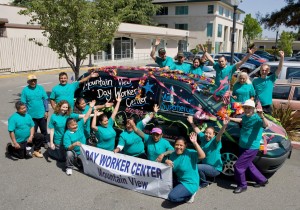Workers’ Rights Cases
CLC represents low-wage workers in two kinds of cases: wage and hour enforcement and unemployment insurance denials. Most of our wage clients work in the “underground economy,” where wage theft and other forms of exploitation are endemic. Our clients work as busboys, dishwashers, gardeners, house cleaners, and in other similar jobs. Many workers in this sector are undocumented immigrants–protected explicitly by California labor standards, but nevertheless vulnerable to threats and intimidation on the basis of their immigration status. Because of the relatively low dollar value of many of these claims, these cases are not attractive to the private bar, and these clients would go without representation if it were not for CLC.

CLC has represented scores of low-wage workers, and has recovered hundreds of thousands of dollars for them. These workers and their families typically live paycheck-to-paycheck, and missing wages can lead to unpaid rent and eviction, consumer debt, and other cascading problems.
In addition to representing workers in individual wage claims, CLC seeks to advance justice for low-wage workers through other means. Students have done many “Know Your Rights” presentations to local groups, have prepared testimony on labor standards bills pending in Sacramento, and in 2015 co-counseled a statewide class action case in federal court on behalf of janitorial workers exploited by a sub-contracting scheme.

House Cleaner Has Day in Court
Many of CLC’s wage cases are tried at the San Jose office of the California Department of Labor Standards Enforcement. Known as “Berman” hearings, for the legislator who introduced the bill creating the agency adjudicative process, these hearings provide students the opportunity for trial work in an administrative tribunal. In the fall of 2015, Virginia “Ginny” Halden (SLS ’16) represented a woman who worked for a housecleaning company for up to 11 hours per day, but was never paid overtime. She also was forced to work “off the clock” at both ends of the work day. Ginny negotiated with the employer’s attorney, but because no settlement was reached, the hearing went forward. Ginny put on testimony, cross examined witnesses, and made closing arguments. The hearing examiner awarded Ginny’s client over $23,000 in wages and penalties.
Dishwasher Fights for His Wages
Nisha Kashyap (’14) and Per Janssen (’14) relax during a lunch break of a bench trial in Santa Clara County Superior Court. The students represented a restaurant busboy whose boss had failed to pay him properly. The case involved both factual disputes and the legal question of what level of “intent” in failing to pay wages is necessary to trigger the governing statute’s penalties. The students examined their own client, cross-examined the employer, and engaged in extensive legal argument with the judge, who also required supplemental briefing. In the end, the court accepted the students’ argument, and awarded the worker his wages along with all of the available penalties.

The Context: Workers' Rights in the Region and around the Nation

Saru Jayaraman, Co-Director of the Restaurant Organizing Centers United (ROC-United) gave an inspiring keynote address at the 2015 SLS Shaking the Foundations conference. Describing harrowing working conditions in many restaurants across thenation, Jayaraman recounted the movement's efforts to raise minimum wages and eliminate tip wages as a legacy of servant culture. Click above to see the video.
Shaking the FoundationsWith offices in New York and in Oakland, NELP works on a huge range of issues affecting low-income workers, including two that touch directly on CLC's practice--endemic wage theft in the low-wage economy and criminal records as barriers to employment. Click above to read more about NELP's work and to understand the national and regional policy context of CLC's workers' rights practice.
NELP